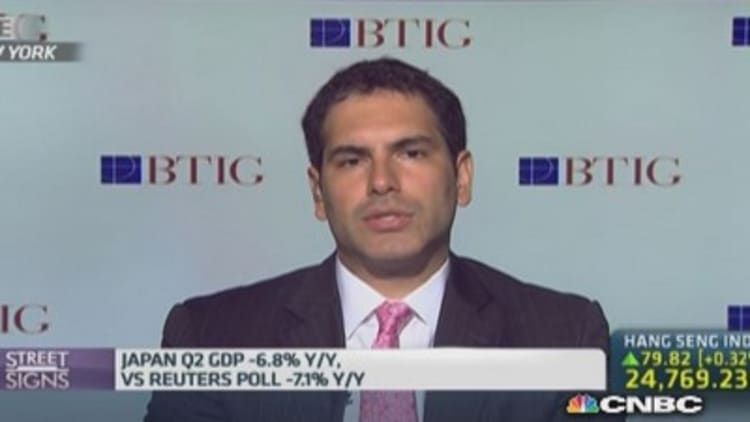
Japan's economic growth may have collapsed in the second quarter but investors aren't giving up on the market, which is negative territory year to date.
Chris Weston, chief investment strategist at IG said Japan is currently his most favored market on account of attractive valuations compared with other developed markets and positive earnings momentum.
"Japan's my number one place to be invested right now," Weston told CNBC on Wednesday.
The price-to-earnings ratio for the Topix - which has fallen over 3 percent this year - is 14.3, compared with 18.2 for the U.S. benchmark S&P 500.
Of the companies on the Topix that have reported quarterly earnings, 52 percent have beat analyst estimates for net income, according to data compiled by Morgan Stanley.
"Corporate Japan is in good shape: we've seen record levels of stock buybacks and a decent earnings season," he said.
The big kicker for the market will come if the Bank of Japan decides to step on the gas pedal again by boosting its asset purchasing program, Weston said.
Expectations for additional monetary stimulus have been on the rise in recent months amid weakening growth momentum owing to the April sales tax hike.
Read MoreJapan shows sharp contraction in second quarter
Asia's second-largest economy suffered its worst contraction since 2011 in the second quarter as higher tax payments weighed heavily on consumer demand. Gross domestic product (GDP) shrank an annualized 6.8 percent in the three months to June, slightly better than estimates for a 7.1 percent drop.
If the government is to proceed with its second consumption tax hike – to 10 percent from 8 percent - in 2015, the central bank will likely need to counter the fiscal tightening with further stimulus, Weston said.
Following the data release, economy minister Akira Amari said that a decision on plans to hike consumption tax by another two percentage points will hinge on various economic data ahead. But Amari remained upbeat on the world's third-largest economy, noting a surge in GDP before a tax hike and a reactionary slump is a normal response. He expects the country to continue a moderate recovery as the effect of the April tax hike wanes, a view shared by some analysts.
Waiting on GPIF
Expectations that Japan's public pension fund, the world's largest around $1.24 trillion, will increase its investment in equities are also contributing to positive sentiment around the market.
According to Reuters, the Government Pension Investment Fund (GPIF) is weighing plans to boost the weighting of domestic stocks to more than 20 percent from a current 12 percent.
"Our view, bolstered by the prospect that the GPIF will revamp its portfolio, remains that Japanese equities will exceed their end-2013 high in the third quarter," Hiromichi Tamura, equity strategist at Nomura wrote in a note earlier this week. The , which rallied almost 60 percent last year, rose as high as 16,320 in December 2013. It is currently trading around the 15,186 level.
Another potential positive driver for the market will be a lowering of the corporate income tax rate starting next year, said Martin Schulz, managing director, international equities at PNC Capital Advisors.
Read MoreBank of Japan keeps policy steady, warns on exports
"We think the structural, third arrow part of 'Abenomics' is slowly but surely coming into view, we have a longer-term positive view on Japan," he said, referring to Prime Minister Shinzo Abe's three-pronged plan to revive the economy.
In June, Abe pledged to lower Japan's corporate tax rate, among the highest in the world at above 35 percent, to less than 30 percent over several years has part of his economic growth strategy.
Skepticism lurks
Dan Greenhaus, chief global strategist at BTIG is not convinced that Abe will pull through with structural reforms needed to put the economy on a sustainable, longer-term growth path.
Read MoreJapan June current account swings to deficit
"Several months ago, there reached a level of exasperation with the Japanese market, in light of the fact that the famous third arrow was never brought to bear," he said.
Abe will need to demonstrate his resolve for reforms if investors are to consider raising exposure to the market, he said.
"While a shift in allocation [by the GPIF] is going to be beneficial in the short term, the question for a lot of investors is not what does the next 6 months look like, but what do the next 3, 5, 7 years look like and ultimately that's a bigger issue," he said.


